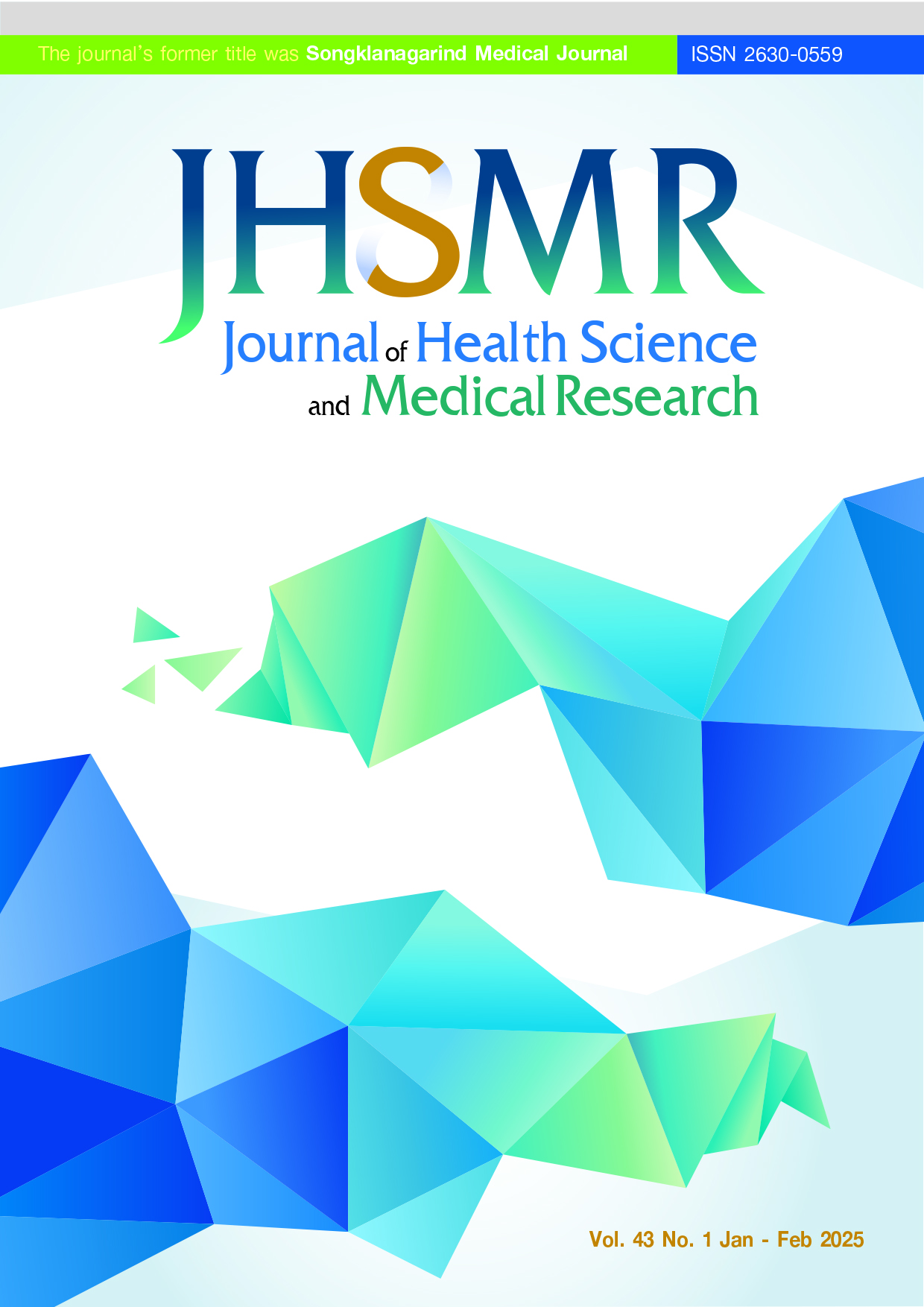Covid-19 Patients with First-Diagnosed Substance Use Disorders in Southern Thailand: A Study from a Field Hospital
DOI:
https://doi.org/10.31584/jhsmr.20241070Keywords:
COVID-19, drug prescription, psychotropic drugs, substance use disorderAbstract
Objective: This retrospective study investigated usage patterns, withdrawal symptoms, and treatments provided to COVID-19 patients with first-diagnosed substance use disorders at a field hospital in southern Thailand in 2021.
Material and Methods: The medical records of all COVID-19 patients were reviewed, and descriptive statistics were calculated and reported. The process of analyzing data was carried out by utilizing Program R.
Results: Of the 2116 patients, 12.9% had a history of substance and/or alcohol use without any prior diagnosis. Most patients were male (94.9%), and the mean age was 31.7 years old. Tobacco and kratom were the substances most frequently used by COVID-19 patients. Withdrawal symptoms were observed in approximately half of all patients with substance use disorders, particularly those who used kratom and opioids. The most commonly reported withdrawal symptoms were insomnia and muscle aches, and chlorpromazine and amitriptyline were the most prescribed psychotropic medications. The majority of patients with substance use disorders (93.8%) did not report any complications related to their COVID-19 infection.
Conclusion: This study found that 12.9% of COVID-19 patients admitted to a field hospital in southern Thailand in 2021 had a newly diagnosed substance use disorder. The substances most commonly used by these patients were tobacco and kratom. Approximately half of the patients with substance use disorders experienced withdrawal symptoms, and kratom and opioids were the substances most frequently associated with these withdrawal symptoms.
References
Wei Y, Shah R. Substance use disorder in the COVID-19 pandemic: a systematic review of vulnerabilities and complications. Pharmaceuticals 2020;13.
Zhu N, Zhang D, Wang W, Li X, Yang B, Song J, et al. A novel coronavirus from patients with pneumonia in China, 2019. N Engl J Med 2020;382:727-33.
Liu J, Lewohl JM, Harris RA, Iyer VR, Dodd PR, Randall PK, et al. Patterns of gene expression in the frontal cortex discriminate alcoholic from nonalcoholic individuals. Neuropsychopharmacology 2006;31:1574-82.
Lewis SM, Williams A, Eisenbarth SC. Structure and function of the immune system in the spleen. Sci Immunol 2019;4.
Patanavanich R, Glantz SA. Smoking is associated with COVID-19 progression: a meta-analysis. Nicotine Tob Res 2020;22:1653-6.
Alqahtani JS, Oyelade T, Aldhahir AM, Alghamdi SM, Almehmadi M, Alqahtani AS, et al. Prevalence, severity and mortality associated with COPD and smoking in patients with COVID-19: a rapid systematic review and meta-analysis. PLoS One 2020;15:e0233147.
Cadet JL, Krasnova IN. Interactions of HIV and methamphetamine: cellular and molecular mechanisms of toxicity potentiation. Neurotox Res 2007;12:181-204.
Zhao SX, Kwong C, Swaminathan A, Gohil A, Crawford MH. Clinical characteristics and outcome of methamphetamine-associated pulmonary arterial hypertension and dilated cardiomyopathy. JACC Heart Fail 2018;6:209-18.
Won S, Hong RA, Shohet RV, Seto TB, Parikh NI. Methamphetamine-associated cardiomyopathy. Clin Cardiol 2013;36:737-42.
Pertwee RG. Pharmacological actions of cannabinoids. Handb Exp Pharmacol 2005:1-51.
Miller AM, Stella N. CB2 receptor-mediated migration of immune cells: it can go either way. Br J Pharmacol 2008;153:299-308.
Pacher P, Steffens S, Hasko G, Schindler TH, Kunos G. Cardiovascular effects of marijuana and synthetic cannabinoids: the good, the bad, and the ugly. Nat Rev Cardiol 2018;15:151-66.
Angkurawaranon C, Jiraporncharoen W, Likhitsathian S, Thaikla K, Kanato M, Perngparn U, et al. Trends in the use of illicit substances in Thailand: results from national household surveys. Drug Alcohol Rev 2018;37:658-63.
Likhitsathian S, Jiraporncharoen W, Aramrattana A, Angkurawaranon C, Srisurapanont M, Thaikla K, et al. Polydrug use among kratom users: findings from the 2011 Thailand National household survey. J Subst Use 2018;23:384-9.
Xu KY, Mintz CM, Borodovsky JT, Glaser PEA, Bierut LJ, Grucza RA. Prevalence of kratom use and co-occurring substance use disorders in the United States. Prim Care Companion CNS Disord 2021;23.
Talek M, Cottler LB, Wichaidit W, Assanangkornchai S. Patterns of kratom use among male drug users in the Deep South of Thailand. THJPH 2021;51:16-24.
Assanangkornchai S, Muekthong A, Sam-Angsri N, Pattanasattayawong U. The use of Mitragynine speciosa (“krathom”), an addictive plant, in Thailand. Subst Use Misuse 2007;42:2145-57.
Saingam D, Assanangkornchai S, Geater AF, Balthip Q. Pattern and consequences of krathom (Mitragyna speciosa Korth.) use among male villagers in southern Thailand: a qualitative study. Int J Drug Policy 2013;24:351-8.
Tungtananuwat W, Lawanprasert S. Fatal 4x100; Home-made kratom juice cocktail. J Health Res 2010;24:43–7.
Department of Disease Control. COVID-19 vaccination guideline 2021 in Thailand (Second Revision). [homepage on the Internet] Nonthaburi: Department of Disease Control, Ministry of Public Health; 2021 [cited 2024 Feb 5]. Available from: https://ddc.moph.go.th/vaccine-covid19/getFiles/11/1628849610213.pdf
ndi.fda.moph.go.th/drug national [homepage on the Internet]. Nonthaburi: National Drug Information; 2022 [cited 2024 Feb 5]. Available from: https://ndi.fda.moph.go.th/drug_national
Onderdonk M, Goldstein N. Substance use disorder treatment through telemedicine in the age of COVID-19. J Addict Nurs 2023;34:96-7.
Kaewkrajang P, Jatchavala C, Sangsuwan T. Anxiety, optimism, and COVID-19 vaccine hesitancy among students in a University in Southern Thailand during the 2021 academic year. Vaccines 2023;11:1157.
Downloads
Published
How to Cite
Issue
Section
License

This work is licensed under a Creative Commons Attribution-NonCommercial-NoDerivatives 4.0 International License.
























